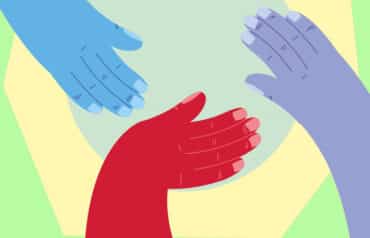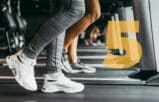In support of flattening the curve of COVID-19 infections, most of us are practicing social distancing and have moved our professional lives from our offices to working at home. For those who regularly work at home, this may not seem particularly challenging. Most have figured out how to keep themselves healthy and protect their sanity while being geographically separate from colleagues. Still, this particular crisis is something we’ve never encountered and all this uncertainty is hard on all of us.
So, here are reminders of ways you can protect your sanity, support your immune system, and stay well during the coronavirus pandemic (and beyond) while working at home.
Boosting Your Immune System
1. Promote gut health with a probiotic
A strong immune system is your first line of defense. Because approximately 80% of your immune tissue is located in your intestines, your overall health is directly connected to your gut health. Boost it by balancing the bacteria in your gut with a probiotic. Probiotics build the good bacteria in your intestines that fight off the bad bacteria, viruses and other pathogens that cause illness and disease. Find probiotics with at least 1 billion CFUs, or colony-forming units, of one or more of these strains: bifidobacterium, lactobacillus and saccharomyces. These sub-strains are the best for boosting immunity: lactobacillus GG, lactobacillus crispatus, lactobacillus gasseri, bifidobacterium bifidum and bifidobacterium longum.
2. Practice “immune-boosting” daily habits
When you have unhealthy daily habits, your immune system may struggle to keep you well while it is fighting the effects of those habits. You can increase your immunity by practicing these healthy habits each day:
- Stay hydrated by drinking plenty of water, limiting sugary beverages, and consuming only reasonable amounts of caffeine.
- Drink alcohol in moderation, or not at all.
- Eat a balanced diet, full of complex carbohydrates, fresh fruits and vegetables, healthy fats and lean proteins.
- Limit sugar because it provides no nutritional value and increases inflammation, a known cause of many illnesses and diseases.
- Exercise regularly, even if it is light exercise like walking.
- Don’t smoke or vape.
3. Supplement your immunity
When we face illness — in particular, viruses — supplements can be one of the best defenses. To boost your immune system, avoid sickness, and reduce the severity of illness if you do get sick, try these supplements:
- Zinc reduces the duration of virus-caused illnesses, like the common cold and influenza, by preventing the virus from multiplying. Some experts believe zinc lozenges can prevent the growth of viruses that cause respiratory infection, like coronavirus, because the zinc is concentrated in the throat, one of the pathways to respiratory infection.
- Vitamin D has been shown to reduce the risk of respiratory infections, with one study showing it reduces the chances of infection by approximately 42%.
- Vitamins A and C encourage the production of white blood cells that help fight infection in the body and enable those cells to function more effectively to keep us well. In particular, one study of pneumonia patients showed that they were deficient in vitamin C, and with supplementation, their recovery times were shortened.
- Elderberry extract is made from the berries and flowers of the elder plant. It is anti-viral and is commonly used to fight respiratory infections by supplying the body with antioxidants to increase immune function.
Rest Your Body and Brain
4. Get enough good sleep
You may find it hard to sleep in this new normal of w0rking at home, pandemic anxiety, market volatility and ever-changing information. But this is one of the most important times to get enough good sleep. Cutting sleep short by even an hour or two a night reduces your immune system’s effectiveness by about 25%. To stay healthy, your body must have time to recover and refresh. Sleep provides this opportunity. The average adult requires seven to eight hours of sleep per night. Set a bedtime schedule and try to stick to it. Don’t watch or read the news right before bed, and keep your devices out of your bedroom, to ensure your brain is ready to rest at bedtime.
Related: “Exhausted? Scrimping on Sleep Is Hazardous to Your Health” and “Five Supplements to Help You Sleep“
5. Give your brain a break with meditation
Recent scientific research has proved the benefits of meditation for our overall health and well-being. The “downtime” of meditation allows our brains time to rejuvenate and reflect. That calms the mind and body so that we can reduce our anxiety and minimize feelings of stress. A regular meditation practice promotes the perseverance and perspective we need to maintain our sanity, especially during times of crisis. A regular meditation practice, of just five minutes per day, will improve your outlook on life and allow you to remain calm.
Related: “Five Ways to Reduce Anxiety in a Worldwide Pan(dem)ic”
Photo by Samia Liamani on Unsplash
*Statements made on this website have not been evaluated by the U.S. Food and Drug Administration. Any information or products are not intended to diagnose, treat, cure, or prevent any disease. Information provided by this website or this company is not a substitute for individual medical advice.
More From Attorney at Work on Dealing With the COVID-19 Crisis:
- “Handling Fear and Stress During a Prolonged Crisis” by Shawn Healy
- “Continuity of Care: Tips for Reassuring Clients You’re Prepared for the COVID-19 Crisis” by Susan Kostal
- “Crisis Evaluation and Messaging Checklist” and “Key Message Matrix” by Gina Rubel
- “The Truth About Remote Working” by Jono Bacon
Get Jamie Spannhake’s Bestselling Book:
 Find Your Calm in the Chaos
Find Your Calm in the Chaos
In “The Lawyer, the Lion, and the Laundry: Three Hours to Finding Your Calm in the Chaos,” lawyer and certified health coach Jamie Spannhake helps you learn how to CHOOSE, ACT and THINK in ways that will clarify your desires and set priorities so you can reclaim your time and enjoy your life.
Available in the Attorney at Work bookstore, here.

















